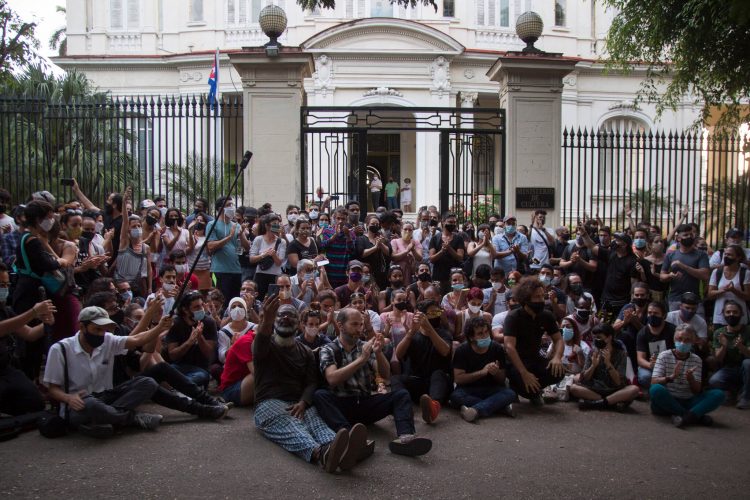Playwright Yunior García Aguilera, one of the most visible faces among the artists who on last November 27 gathered outside the Cuban Ministry of Culture, this Tuesday made public a request to demonstrate peacefully, signed by a group of “about twenty citizens” and handed over to the government of Havana.
“The march will be against violence, to demand that all the rights of all Cubans be respected, for the release of political prisoners and for the solution of our differences through democratic and peaceful means,” read the letter shared on social media.
En el mediodía de hoy, martes 21 de septiembre, se entregaron cartas en la recepción del Gobierno Provincial de La Habana y en la oficina del Intendente del CAP La Habana Vieja. pic.twitter.com/ln73xI0hUJ
— Archipiélago (@ArchipielagoCu) September 22, 2021
The call, released on the Facebook Archipiélago group, created by Yunior himself, is addressed to the provincial and municipal authorities of the Cuban capital and explains that the “peaceful and civic” mobilization would be held from 2:00 a.m. in the afternoon of Saturday, November 20 and would have an estimated attendance of 5,000 people.
However, one of the requests of the letter is that anyone who is interested and complies with the call can join. In addition, it requests that the government protect the protesters from those who try to prevent the mobilization, as well as allowing coverage by the national and foreign press, official or independent.
According to the details advanced, the march would begin in Malecón and Prado to continue to the Parque Central, where they would deposit flowers at the statue of José Martí, and then culminate in front of the National Capitol, seat of the Cuban Parliament.
“To demonstrate peacefully is a human right recognized in the Constitution of the Republic itself. Violating or preventing this full exercise constitutes a crime,” underlines the letter backed by a score of signatures, among them those of independent artists and opposition activists.
A similar letter, addressed to the municipal mayor of Holguín, was delivered this Wednesday with the purpose of carrying out a march on the same day and at the same time from the steps of Loma de la Cruz to José Martí Park. It is signed by some thirty artists and activists from that territory.
Cuban activists asked the government for authorization to carry out a “peaceful and civic” march for respect for “all the rights of all Cubans.”
Una treintena de holguineros también han realizado formal solicitud a la intendencia municipal de #Holguín para celebrar la Marcha contra la violencia el 20 de Noviembre.#Archipielago #LaCalleEsDeTodosLosCubanos pic.twitter.com/8qvJmAqZJ0
— Archipiélago (@ArchipielagoCu) September 22, 2021
So far there is no official statement or response to these requests.
According to what has transpired, the organizers of these initiatives hope that similar requests will be made in other places in the country. The date of the call coincides with that of the first Saturday after the recently announced reopening of the island to tourism and international flights on a larger scale.
In addition, if held, the demonstrations would take place a week before the one-year anniversary of the events of November 27, 2020, when a group of young Cuban artists and activists met in front of the Ministry of Culture to demand a dialogue with the authorities of the sector and speak out in favor of freedom of expression and creation on the Island.
At that time, a representation of the group finally met with cultural authorities, but then the dialogue process failed, with cross-complaints between both parties. Independent artists and activists assure that the government does not have a real will to dialogue and that some of its members have been harassed and repressed by the authorities, while the government accuses part of the protesters of following a destabilizing agenda and being paid by the U.S. government.
These same arguments have since been reiterated by Cuban representatives and official media, pointing out opposition artists and activists as agents of a “soft coup” against the socialist system, some of them detained or under investigation and restricted in movement.
This call is made public just over two months after the July 11 protests in Cuba, when thousands of people demonstrated for different reasons: economic, social and political. At that time there were manifestations of violence, very rare in Cuba, both by protesters and those who opposed them and the law enforcement forces. Although there are no official data in this regard, figures of hundreds of arrests are being handled as a result of those events that occurred in the midst of a complex economic, social and health situation on the island.










